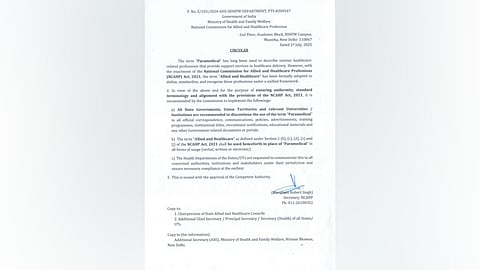

The Ministry of Health and Family Welfare has officially directed all states, union territories (UTs), and healthcare institutions across the country to discontinue the usage of the term “Paramedical” in all official, academic, and public communications.
The circular issued today – July 1, 2025, is in line with the enactment of the National Commission for Allied and Healthcare Professions (NCAHP) Act, 2021.
What does the circular say?
In a circular issued by the NCAHP, the government emphasised that the term “Allied and Healthcare” will now replace “Paramedical” in all written, verbal, and electronic communications to ensure uniformity and alignment with the provisions of the 2021 Act.
“The term ‘Paramedical’ has long been used to describe various healthcare-related professions that provide support services. However, with the enactment of the NCAHP Act, 2021, the term ‘Allied and Healthcare’ has been formally adopted to define, standardize, and recognize these professions under a unified framework”, said the circular.
As part of the directive, all state governments, UT administrations, and concerned universities or institutions have been advised to discontinue the use of "Paramedical".
“All State Governments, Union Territories and relevant Universities / Institutions are recommended to discontinue the use of the term "Paramedical" in all official correspondence, communications, policies, advertisements, training programmes, institutional titles, recruitment notifications, educational materials and any other Government-related documents or portals”, read the circular.
State health departments have been urged to disseminate the directive to all stakeholders and ensure compliance at the earliest.
What does it mean?
The term "Allied and healthcare" will now include professionals in the fields of Medical Lab Technology, Radiology, Operation Theatre Technology, Anaesthesia, Dialysis, Optometry, and Cardiac Care, among others. These professionals play a vital role in supporting doctors, conducting diagnostic tests, managing emergency care, and ensuring the smooth operation of clinical services.
This move, which is being widely welcomed by allied and healthcare professionals across the country, could mark a significant milestone in their institutional recognition.
